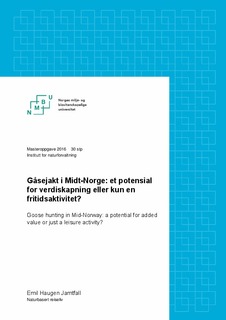| dc.contributor.advisor | Aas, Øystein | |
| dc.contributor.author | Jamtfall, Emil | |
| dc.coverage.spatial | Norway | nb_NO |
| dc.date.accessioned | 2016-08-09T12:27:00Z | |
| dc.date.available | 2016-08-09T12:27:00Z | |
| dc.date.issued | 2016-08-09 | |
| dc.identifier.uri | http://hdl.handle.net/11250/2398501 | |
| dc.description.abstract | Den økte bestanden av Svalbard-hekkende av kortnebbgås har ført til en konflikt med jordbruket, og en vekst i antall gåsejegere langs Trondheimsfjorden. Fylkesmannen i Nord-Trøndelag oppfordret i 2007 grunneiere til å organisere jakten for å øke uttaket av gjess, redusere bestandsveksten og dempe konflikten med gårdbrukerne. En grunneierundersøkelse fra 2014 viser at svært få oppgir ekstrainntekt som motivasjon for å tillate jakt på sin eiendom. Denne oppgaven søker ved å innhente kvalitativ informasjon å belyse hvilke holdninger som ligger til grunn for resultatene i spørreundersøkelsen, og i hvilken grad organisering av jakta påvirker grunneiernes syn på gjess.
Det er vanskelig å peke på en klar kobling mellom organisering av gåsejakta og informantenes holdning til gjess. Samtidig viser resultatene at grunneiere gjennom eiendomsoverbyggende samarbeid har fått større kunnskap og interesse for gjess. Grunneiernes motivasjon for å tillate jakt på sine eiendommer ligger først og fremst i en redusert bestand kortnebb- og grågjess. Årsaken til at få grunneiere oppgir ekstrainntekt eller økonomiske ringvirkninger i lokalsamfunnet som motivasjon ligger i en nøktern vurdering av organisert gåsejakts inntektspotensial. Resultatene viser også at eier- og eiendomskarakteristika ser ut til å ha betydning for grunneieres syn på gjess som tilleggsnæring.
Grunneierne mener at fellesforvaltning av gjess er avgjørende for å lykkes som tilbyder av gåserelatert turisme, men er samtidig klar på at eiendomsoverbyggende samarbeid kan bli utfordrende når motivet er verdiskapning og ikke forvaltning. Videre arbeid med organisering av gåsejakten bør i første rekke fokusere på forvaltning av gjess og konflikten med landbruket. Det er likevel ingen grunn til at verdiskapning ikke kan eller bør kombineres med dette arbeidet i fremtiden. | nb_NO |
| dc.description.abstract | The increase of the Svalbard population of pink-footed geese has led to a conflict with agriculture and also to an increased hunting activity along the Trondheim Fjord. In 2007 the county governor of Nord-Trøndelag urged landowners to organize a hunt to increase the harvesting of geese, reduce population growth, and dampen conflict with farmers. A landowner survey in 2014 shows that very few landowners view extra income is an incentive to allowing hunting on their property. This study searches to obtain qualitative data that illustrates the attitudes that underlie the results of the survey, and to what degree the organization of hunting affects farmers attitudes towards geese.
It is difficult to find a direct link between the organization of goose hunting and farmers’ attitude towards geese. However, the results show that landowners, through co-management, have gained a greater knowledge and interest in geese. A reduced population of pink-footed and greylag geese is the foremost reason landowners allow goose hunting on their properties. However, the results also show that landowner and property characteristics appear to influence how farmers see geese as a potential additional trade.
Landowners believe that co-management of geese is critical for succeeding as a provider for goose related tourism. They are simultaneously aware that cooperation can be challenging when the goal is value creation and not management. Further work on the organization of goose hunting should primarily focus on management of geese, and their conflict with agriculture. This study shows that there no reason why added value can not, and should not, be implemented in future management. | nb_NO |
| dc.language.iso | nob | nb_NO |
| dc.publisher | Norwegian University of Life Sciences, Ås | |
| dc.subject | Kortnebbgås | nb_NO |
| dc.subject | verdiskapning | nb_NO |
| dc.subject | jaktorganisering | nb_NO |
| dc.subject | fellesforvaltning | nb_NO |
| dc.title | Gåsejakt i Midt-Norge : et potensial for verdiskapning eller kun en fritidsaktivitet? | nb_NO |
| dc.title.alternative | Goose hunting in Mid-Norway: a potential for added value or just a leisure activity? | nb_NO |
| dc.type | Master thesis | nb_NO |
| dc.subject.nsi | VDP::Social science: 200 | nb_NO |
| dc.subject.nsi | VDP::Agriculture and fishery disciplines: 900::Agriculture disciplines: 910::Management of natural resources: 914 | nb_NO |
| dc.source.pagenumber | 52 | nb_NO |
| dc.description.localcode | M-REIS | nb_NO |
